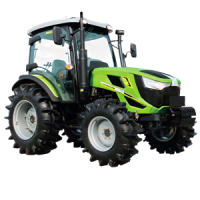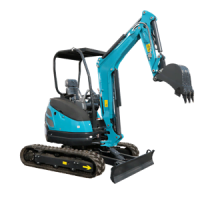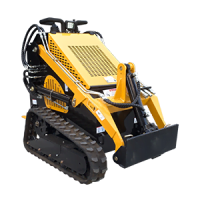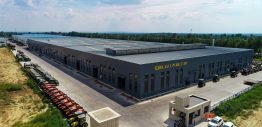Farm tractors are the workhorses of agriculture, and selecting the right one is a critical decision for farmers. It’s not just about power and size; economic factors play a pivotal role in determining which tractor suits a farm’s needs best. In this comprehensive article, we will delve deep into the economic considerations that farmers must weigh when choosing the right farm tractor.
The Role of Farm Tractors in Agriculture
Tractors as Agricultural Backbone
Farm tractors are indispensable to modern agriculture. They perform a myriad of tasks, from plowing and planting to harvesting and material handling. Their efficiency directly impacts a farm’s productivity and profitability.
The Need for Precision
In today’s agricultural landscape, precision and efficiency are paramount. The right tractor can make all the difference in optimizing resource utilization and reducing operational costs.
Analyzing Farm Size and Scope
Matching Tractor to Farm Size
Farm size is a crucial factor in selecting the right tractor. Small-scale farms have different requirements than large-scale operations. Tractors must align with the farm’s capacity to ensure economic viability.
Customization and Versatility
Modern tractors offer various customization options. Farmers can choose between compact utility tractors for smaller farms or larger models with diverse capabilities for extensive operations. Versatility in attachments further enhances a tractor’s economic value.
Assessing Power and Efficiency
Power Requirements
The power of a tractor should match the tasks it needs to perform. Underpowered tractors can lead to inefficiencies and increased operational costs, while overpowered ones may result in wasted fuel and resources.
Fuel Efficiency
Fuel consumption is a significant economic consideration. Tractors with better fuel efficiency reduce operating costs over the long term, making them financially appealing choices.
Budget Constraints and Financing
Evaluating Budget Constraints
Farmers must work within budget constraints when acquiring a tractor. The initial purchase price is just one part of the financial equation; ongoing maintenance and operational costs should also be factored in.
Financing Options
Farmers often explore financing options, such as loans or leasing, to acquire tractors. Understanding the financial implications of these options is essential for making an economically sound decision.
Maintenance and Reliability
Long-Term Costs
The economic impact of a tractor extends beyond its purchase price. Regular maintenance and repair costs can accumulate over time. Choosing a reliable brand and model can reduce these expenses.
Resale Value
The resale value of a tractor is another critical consideration. Some brands and models retain value better than others, providing a potential return on investment when it’s time to upgrade.
Environmental Considerations
Sustainable Farming Practices
Environmental consciousness is increasingly important in agriculture. Some tractors offer eco-friendly features, such as low-emission engines and alternative fuels, which align with sustainable farming practices.
Regulatory Compliance
Adhering to environmental regulations is not only an ethical but also an economic consideration. Non-compliance can result in fines and legal issues that impact a farm’s bottom line.
Technology and Precision Agriculture
The Role of Technology
Technology, including GPS systems and data analytics, has transformed farming. Tractors equipped with these features can enhance precision, reduce input wastage, and ultimately improve economic outcomes.
Precision Agriculture and Efficiency
Precision agriculture, enabled by technology, plays a crucial role in economic considerations. Farmers can optimize planting, irrigation, and harvesting, maximizing crop yields while minimizing costs.
Choosing Between New and Used Tractors
New vs. Used Tractors
The decision between new and used tractors depends on budget, specific requirements, and expected longevity. New tractors often come with warranties and the latest technology, while used ones may offer cost savings.
Cost-Benefit Analysis
Conducting a cost-benefit analysis is vital when choosing between new and used tractors. Consider factors like depreciation, maintenance, and expected performance over time.
Frequently Asked Questions
Q1: What is the most critical economic factor when choosing a farm tractor?
While several economic factors are important, matching the tractor’s power to the farm’s needs is crucial. An inadequately powered tractor can lead to inefficiencies, while an overpowered one can waste fuel and resources.
Q2: How can I assess a tractor‘s fuel efficiency before purchasing?
Tractor manufacturers typically provide fuel efficiency data for their models. You can also seek advice from experienced farmers and consult online resources and reviews to gauge a tractor’s fuel efficiency.
Q3: Are there government programs or incentives to help with tractor purchases?
In some regions, there may be government programs or incentives aimed at supporting farmers with tractor purchases. These programs can vary, so it’s essential to research what’s available in your area.
Q4: How do I ensure compliance with environmental regulations when selecting a tractor?
Choosing a tractor with eco-friendly features, such as low-emission engines, is a step towards compliance. Additionally, staying informed about local and national environmental regulations is crucial to avoid non-compliance issues.
Q5: What role does precision agriculture play in economic considerations?
Precision agriculture, facilitated by technology like GPS systems and data analytics, significantly impacts economic outcomes. It optimizes resource utilization, reduces input wastage, and enhances overall farm efficiency.







-1.png)